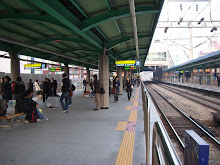
In the world of Korean school public education, nothing brings fear to the hearts and minds of teachers like the words ‘open class.’
We don’t really have anything like this in America. The closest comparison that comes to mind is Open House. You know, that event schools halfheartedly hold sometimes in which parents are usually too busy to show up. Parents that do manage to show up become weird, crazed versions of their former rational parenting selves. They enter a quasi-attack mode in which they use a technique called, in some circles, ‘ferocious niceness’ in an attempt to intimidate their children’s teachers into saying good things about their kids.
No, Korean school open class is an entirely different animal. The Seoul Metropolitan Board of education just passed a law (I guess technically it’s a ‘policy’ but policies feel like law here) that requires each teacher to open their class to families, teachers and administration four times a school year. This means that teachers are teaching an open class roughly once every other month. (This is my information for elementary schools, not sure about other levels)
I know what you’re thinking…so what? It’s forty minutes and the worst you have to endure is some smiling parents and an evaluation by the administration.
Wrong. So wrong.
The whole Open Class process lasts nearly a month in which time teachers slave over lesson plans-- re-working games, designing materials, meeting with administration to discuss their lesson plans, practicing the open class lesson on other classes. Teachers are required to consider ridiculous factors in their planning. For example, last year, my co-teacher freaked out two days before our lesson because she realized that the board game we were scheduled to play required the students to roll dice, and the dice would make too much noise on the desk top. She spent the next hour cutting out square pieces of green felt that she would put on the students’ desks before class began to dull the sound.

(Some kids at an English class I worked in over the winter. These boys chose me as their favorite teacher and followed me around. At least, that's what I like to think)
I was woefully naïve of the whole meticulous process. I thought, stupidly, that once we came up with our lesson plan (which had to be turned in to the administration over a week before we were due to teach the class), there would be nothing to it except to make the materials and teach the class. I was mistaken. Here is a quick list outlining the Open Class Process in further detail:
1. Pick your class.
This is tricky because you want to pick the class that has been the best. This means that the class participates well, is well-behaved and easily managed. The trick is that you can’t pick a class that you have already used before in a previous open class. Also, you can’t pick a class that another subject teacher (like science, music, etc) picked for their open class. These are the rules as stated by The Administration.
2. Come up with your lesson plan.
A typical lesson plan has an introduction section, a development section, and a closing section. Your introduction section has to include a review and some sort of motivation to get the students interested. Your development section must include GAMES.
Oh games. I think I have to take a minute to comment on Korean Elementary school English games. These are the bread and butter of our lesson plans. If students don’t get to play a game during a lesson, they demand to know why. If the rules of the game are interpreted by the students as somehow unfair, we have to figure out how to rework the game so it works for them. We can’t repeat the same games too closely or the students get bored. The games can’t be too hard or the students will give up. The games must be a delicate balance between fun and using the target vocabulary and grammar for each lesson. Too much of the former and you haven’t accomplished anything real in your class, too much of the latter and your class feels like a flop because the students won’t play. As a result of these restrictions (and others like them), games have become recycled and unvaried. (for those of your interested, there are three main types of games: card games, PPT games, speed games)

(Can you see me in the background? I'm attempting to manage the kids and make sure they share their food)
During open class, there are other, more strenuous variables to consider. During the open class, teachers ‘should’ include group work/pair work, individual work and class work. During the open class teachers ‘should’ have students doing listening activities, reading activities, and speaking activities. Parents want to see their children participate in class, so teachers ‘should’ include exercises that highlight individual student participation. These variables ‘should’ be considered along with the previously mentioned game requirement and accompanying restrictions. These are the rules as stated by The Administration.
3. Create your materials
A teacher ‘should’ look like she has put extra effort into the class. This often means creating his or her own materials via coloring or computer. For the last class, I spent an entire morning drawing and coloring an American flag and a restaurant menu for the motivation section of one open class. Teachers laminate flashcards, glue magnets onto everything so, if need be, it can be stuck to the blackboard for display, slave over Power Points, preview classrooms so that they can make sure the classroom is arranged to fully cooperate with their lesson plan. There is much prepwork to be done in the days preceding an open class.
4. Meet with the Administration.
This is the pre-open class meeting in which teachers submit their lesson plan (that they have already changed many times) to the scrutiny of men who haven’t taught in a classroom in twenty years (and who also probably had little interest in teaching, only in climbing the administrative latter). These men evaluate the lesson plan based on the above criteria and make alterations. No lesson is safe from administrative alteration. It is done so that the administration can feel as if they are doing their job successfully, not so much for the benefit of the students.
5. Prepare for the show
After the class has been picked, and all alterations to the lesson plan are complete, and the administration has approved the paperwork, and the materials created, it is time to start rehearsals…err, I mean practicing. Teachers practice their open class lesson plan on the other classes in the grade that have not been lucky enough to be picked for the Big Day. This processes is nerve-racking, because if it doesn’t go over well with the students, teachers must go back into the lesson planning phase, sometimes as late as the date before the open class.
The second part of preparation is training the class that was picked for open class. Teachers threaten, manipulate, persuade, and do anything short of promising to give them all As in return for their promise to act like good students on the Big Day. By the time the open class actually happens, students are no longer acting like themselves, but instead acting like Adderall-dosed robot children who have been programmed specifically to answer the right questions at the right time. They know all the words and motions to the songs by heart because they have been made to sing the song almost 30 times in the days leading up to open class. They know the correct responses to the teacher’s opening greeting because it’s been drilled into their heads through repetition exercises. I often feel bad for these classes whose award for good behavior and participation is a week of repetitive and anxious English class rehearsals.

(This is Jill. She's smart, but socially awkward so the other kids don't like her. She's all out all the time and sticks close to the teachers.)
So Why? Why do the teachers go to such strenuous lengths for Open Class?
Because they are the rules as stated by the Administration. The Administration is law.
After open class is over, the teachers have another post-open class meeting in which the administration evaluates individual teachers’ open classes publicly. Last year, I heard horror stories of teachers crying in the middle of the meeting (which is a dinner to reward teachers for their hard work). The administration can sometimes critique teachers on the most ridiculous and unreasonable things, such as the noise from rolling dice for a board game. There are catch-22s in which teachers can’t be right. Like, for example, the board should look neat and presentable during open class. So if, for example, you’re playing a game in which students move magnetized picture cards around on the board the end result could look messy. No problem, just remove the cards after the game is over, right? However, another rule is that you should not mess with already-used classroom materials until after the class is over. This rule also sucks when you play something like a board game and the students keep playing with the dice you weren’t allowed to pick up while you’re trying to explain a new game.
The good news is that my open classes are over and done with for the year! I just finished last week and the only major thing left on the ole’ Korean Public School Teaching agenda is summer camps. I can’t wait to tell you about those.
























